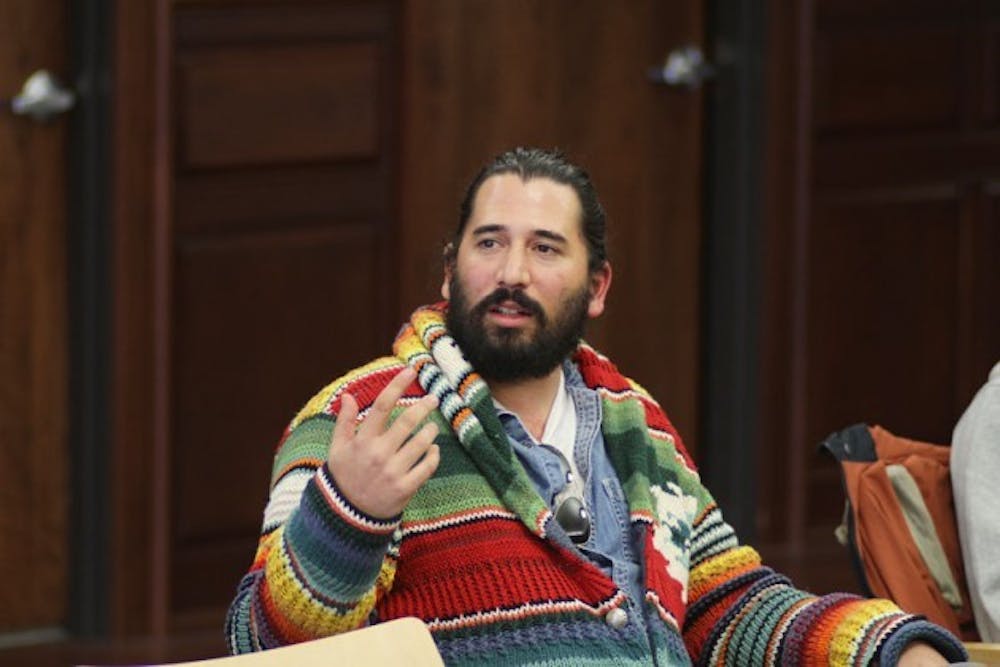After squatting in an abandoned 40,000-square-foot office and siphoning electricity through an outlet plugged into the only functioning light bulb on the floor, Dan Gardner and his associate were faced with a decision: Should they power another computer monitor or heat their office during the winter?
Although Dan Gardner attended four years of school in Buffalo, enduring the arctic winters its prone to, this was not an easy decision to make.
Gardner graduated with a Bachelor of Fine Arts from UB in 2001 and got his first job at an ad agency after graduation. After few months of uninspiring work and feelings of wasted creativity, he said, “this can’t be it,” and quit his job.
Gardner and his childhood friend, Brandon Ralph, co-founded the company Code and Theory later that year. Code and Theory develops products and branding strategies for companies, and help to market the products they produce.
Code and Theory has worked for a diverse array of companies including Vogue, Snapple, Motel 6 and the Los Angeles Times.
“When we started, we were working on anything,” Gardner said during a Q&A at the Honors College last week. “We did nonsense work. A photographer friend or a band friend would give us $200 and we’d work like three months on a $200 project. We’d get like a penny an hour or something. We had nothing. I was living on couches; I had no money. But to us, it didn’t matter. It was a very, very hard time. But it was a great time.”
Code and Theory operated out of a small apartment building until the company upgraded to a vacant office previously used by an ad agency, which had no electricity. Eventually, when they started to get more substantial work, they found their own office and started paying rent.
“Once we got our own office space that we were paying for and got our first real employee, we were out of fantasy land,” Gardner said. “We knew we had to step it up.”
During his visit to UB Thursday, Gardner spoke to students about his experience in Buffalo and his transition into the real world.
Gardner told students that designing for a client is comparable to the responsibility of coursework “times a thousand.” Although he admits to being a B student who procrastinated in college, Gardner’s work ethic has shifted significantly with the responsibility of running a successful business and employing people whose families rely on their income.
The work place has no tolerance for laziness, according to Gardner, but there is an acceptance for failure as long as you put in your best effort.
“Don’t let any barrier stop you,” Gardner said. “If I wanna do something, I’m gonna do it. And if I’m gonna do it, I’m gonna do it the best I can. And if I’m gonna fail, I’m OK with failure, but I’m not OK with failure if I didn’t do my best.”
Kenny Cruz, a junior communication design major, was particularly affected by this philosophy. After hearing Gardner speak at the Q&A, Cruz realized failure is unacceptable if you fail without trying. This insight gave him more momentum to try harder in the future.
“There were so many opportunities that the school gave me,” Gardner said. “That freedom of opportunity that I had – it’s like a fantasy land. School is all like, fake responsibility. It’s not like real responsibility. But the fantasy land is a fun place to explore and be creative.”
Gardner didn’t have the ambition to become an entrepreneur or start a business while in college, but his time at UB fostered his ability to solve problems creatively. This allowed him to successfully run and operate a business.
Gina Cali-Misterkiewicz, communications officer for the College of Arts and Sciences, attributes the success of Code and Theory to the creator’s dissatisfaction with stagnancy, which drives them to always be innovating.
“I think I have a problem,” Gardner confessed. “I can’t look at anything in this world and not think about how it could be better. I’m of the philosophy that if it exists, it matters. And if it matters, it could be better.”
Their company philosophy is to set, deliver and exceed expectations consistently. Today, Code and Theory employs almost three hundred creative thinkers that work in offices in New York City, San Francisco, London and the Philippines.
“We’re a values based company,” Gardner said. “With every hire we think, ‘What could they add that we don’t have?’ We surround ourselves with people that are going to help us achieve our goals and challenge each other.”
Gardner shared his values with students from both the management and art department during his stay. He gave a lecture to a management class earlier in the morning and revisited the Center for the Arts – the location where he spent the majority of his college career in “fantasy land.”
Domenic Licata, Instructional Support Technician and instructor with the Department of Art, was disappointed Gardner didn’t get to spend as much time with art students as he did with management students.
“[Gardner’s] message of creativity in everything, and design being everything, allowing him to solve problems by breaking arbitrary rules, doing what’s right over what’s legal (though that could be touchy) could be the most important lesson those business students have learned,” Licata said in an email.
Creativity is at the center of Gardner’s life, he said. He used his time at UB to explore the vastness of his creativity by going beyond coursework guidelines and pushing past the confines of the curriculum.
“Don’t be restrained by arbitrary boundaries,” Gardner said. “My whole life I felt like that was the approach I took. It’s not always about following the law, but it’s about always doing the right thing.”
Gardner’s approach to business reflects his approach to life and has led to Code and Theory’s business mantra in which the company only wants to be limited by its own creativity.
email: arts@ubspectrum.com





